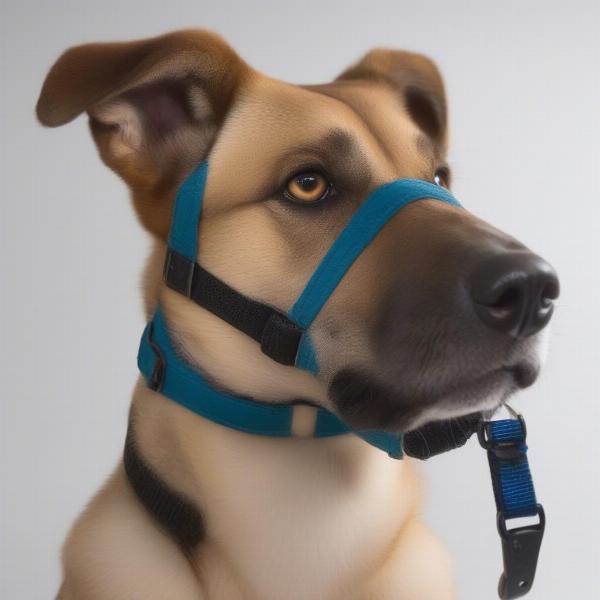Rude dog tools, often misunderstood as instruments of punishment, can actually be valuable aids in managing canine aggression and promoting safety for both the dog and those around them. It’s crucial to remember that these tools are not intended to inflict pain but rather to provide control and prevent dangerous situations. Selecting and using these tools responsibly is paramount. This article will explore the various types of “rude dog tools,” their appropriate uses, and the importance of combining them with positive reinforcement training methods.
When we talk about “rude dog tools,” we’re primarily referring to muzzles, head halters, and sometimes even prong collars. While the term might sound harsh, these tools, when used correctly and humanely, can be instrumental in managing a dog’s aggressive tendencies. They provide a level of control that allows owners and trainers to safely work with the dog, prevent bites, and implement behavior modification techniques.
Different Types of “Rude Dog Tools” and Their Uses
Muzzles: Preventing Bites and Ensuring Safety
Muzzles are perhaps the most commonly recognized “rude dog tool.” They come in various forms, including basket muzzles, soft muzzles, and short-snout muzzles. Basket muzzles are generally preferred as they allow the dog to pant, drink, and even take treats while wearing them. Muzzles are essential in situations where a dog’s aggression poses a risk to others, such as during veterinary visits, grooming appointments, or when introducing a new dog to the household.
 Dog with a head halter
Dog with a head halter
Head Halters: Gaining Control and Redirecting Focus
Head halters, similar to horse halters, work by gently redirecting the dog’s head. By controlling the head, you gain control over the dog’s body and attention. This can be particularly useful for dogs who exhibit leash reactivity or aggression towards other dogs or people while on walks.
Prong Collars: A Controversial Tool for Extreme Cases
Prong collars are a more controversial tool and should only be used under the guidance of a certified professional dog trainer experienced in their proper application. These collars exert pressure evenly around the neck when the dog pulls, mimicking the sensation of a mother dog’s correction. While they can be effective in certain situations, they should be used with extreme caution and never as a punishment tool.
The Importance of Positive Reinforcement
It’s vital to understand that “rude dog tools” are not a standalone solution. They are management tools that should be used in conjunction with positive reinforcement training. This involves rewarding desirable behaviors, such as calmness and obedience, with treats, praise, or toys. By pairing the use of these tools with positive reinforcement, you can help your dog learn alternative behaviors and gradually reduce the need for the tools altogether.
Conclusion: Responsible Use for a Safer Environment
“Rude dog tools,” when used responsibly and ethically, can be invaluable in managing canine aggression and creating a safe environment for both the dog and its surroundings. These tools are not about punishment; they are about providing control and facilitating the implementation of effective training techniques. Remember, positive reinforcement is crucial, and seeking professional guidance is always recommended.
FAQs
- Are “rude dog tools” cruel? No, when used correctly and humanely, these tools are not designed to inflict pain but rather to provide control and prevent dangerous situations.
- Can I use a prong collar on my own? It’s strongly recommended to consult with a certified professional dog trainer before using a prong collar.
- What type of muzzle is best for my dog? Basket muzzles are generally the best choice as they allow for panting, drinking, and treat-taking.
- Will using these tools make my dog more aggressive? No, when combined with positive reinforcement training, these tools can help reduce aggression by enabling you to manage and modify your dog’s behavior.
- How do I find a qualified dog trainer? Look for certified trainers with experience in positive reinforcement methods and a clear understanding of canine behavior.
About ILM Dog
ILM Dog is your trusted international resource for expert dog care advice. We specialize in providing guidance on all aspects of dog ownership, from breed selection and training to health care, nutrition, and product recommendations. Whether you’re a new dog owner or a seasoned expert, ILM Dog is here to support you. Contact us for personalized advice: Email: [email protected], Phone: +44 20-3965-8624.